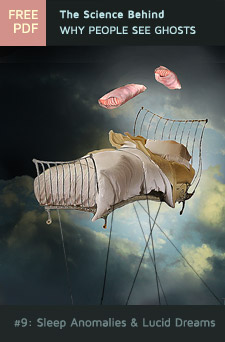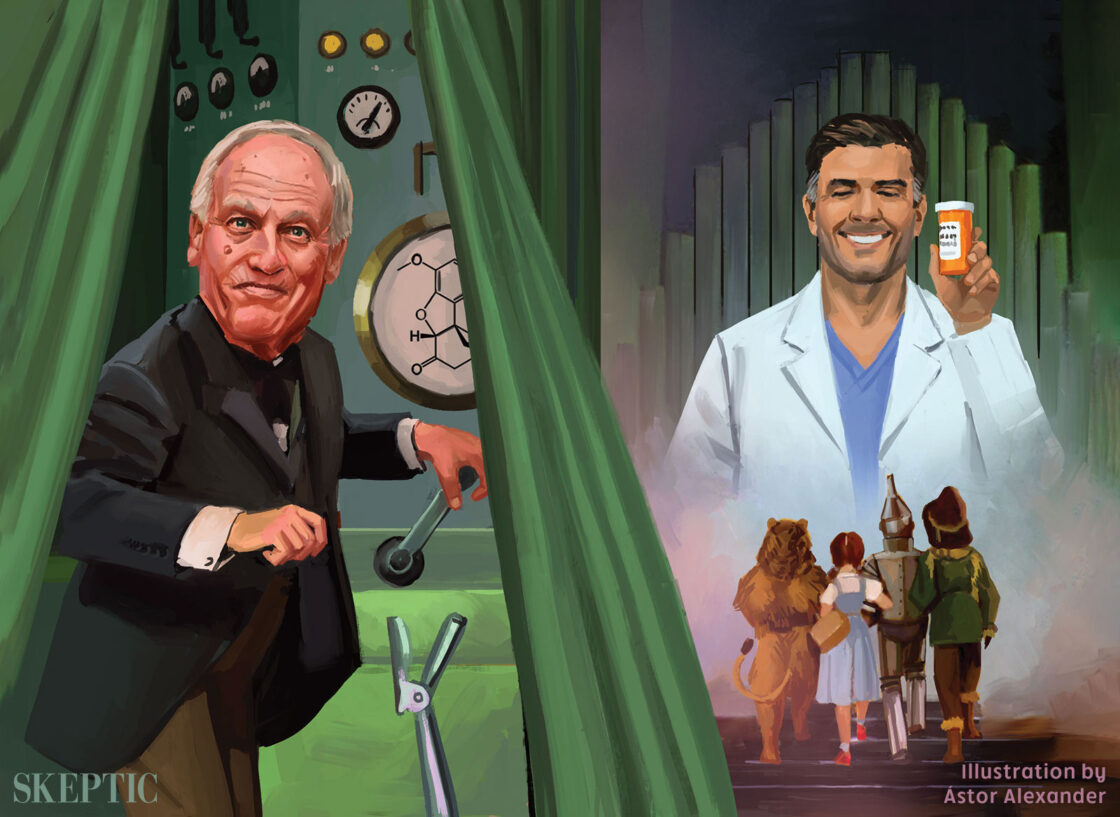Do you know someone who has had a mind altering experience like the examples that we list in this FREE PDF booklet? If so, you know how compelling they can be. A life can be changed or an entire religion founded on the basis of a single brain-generated hallucination. These phenomena are so powerful that throughout history seekers of knowledge have sought to induce them. They are one of the foundations of widespread belief in the paranormal. But as skeptics are well aware, accepting them as reality can be more than a waste of time and energy. It can be dangerous for both the individual and larger society.

FREE PDF DOWNLOAD
The Science Behind Why People See Ghosts (and gods, angels, demons, and aliens and why they float, fly, and travel out of their bodies)
While science has made considerable progress in discovering how the brain is hard-wired to produce these illusions, the public is largely unaware of much of this research. This is where your Skeptics Society comes in—we provide the scientific explanation.
This article was published on November 20, 2013.

















How about Evps? EMP fluctuations? Poltergeist activity? …there IS a scientific reason behind the existence of ghosts. And it will lead to further understanding to the nature of physics!
This does not explain shared visions, shared dreams, and other people seeing the astral form of another whilst they are asleep and experiencing an OOB. I have had direct experience of all these. I am a sceptic and hold a science degree, but the hallucination theory doesn’t hold up for these experiences.
The brain is a powerful misunderstood organ, but as someone who believes in a omnipotent creator, the fact that man cannot understand fully what God created does not surprise me nor does it prove that the “single brain-generated hallucination” was not generated by the creator of the brain but by the person. It simply proves that the brain generates hallucinations which man has known for centuries, the question has always been not how but WHO generated it and for what purpose. Science still has not answered that question as it is limited by the ability of that same brain.
It would be nice if there were more instructions for inducing the experiences. That would really show an understanding of the causes and effects. IT would also allow me to have such experiences. And that would be a fine enjoyment.
Doesnt really explain multiple witness’ and radar sightings,not to mention scrabbleing military jets,lol.
Well as someone who’s suffered from night terrors as a child and sleep paralysis in my older years concrete rationalization of ghosts would be great but, it certainly is a philosophical rabbit hole and it doesn’t close the book on out of body consciousness rather simply tackle apparitions.
I’ve never had night terrors, but I’ve definitely had sleep paralysis several times. So, if have to agree with you on this one.
I had sleep paralysis for years. it was a symptom of Obstructive Sleep Apnea. You wake up from an episode of Apnea, where your air passages close, while in the early stages of sleep. You are able to be conscious that you have woken, but you cannot move due to our bodies’ mechanism against flailing around and acting out our dreams. You cannot breath, cannot move, and are terrified.
Had the surgery a few years ago. Fixed it right up!
Interesting article but are there any citations available? I would be interested to look into some of the referenced material.
There are masses of citations for the studies mentioned here. Google any of them that particularly interest you, using eg the scientist’s name and field of study. Oliver Sacks’ “Hallucinations” is excellent and you can watch him talking about them, for TED, here : http://www.ted.com/talks/oliver_sacks_what_hallucination_reveals_about_our_minds.html
This only proofs that there is a brain generated hallucination. I am a skeptic and i need to investigate more about ghosts. As regards Atheism,it depends on us to decide. Scientists are divided in threes ,believers , atheists and agnostics.
https://www.youtube.com/watch?v=VUTE5x-ghd8
I’m not sure you can really believe in science. You can hypothesize based on gathered data, but it doesn’t or shouldn’t ever require you to believe… unless you mean “be passionate”.
Atheism and agnosticism are not mutually exclusive. Many atheists are agnostic atheists. Agnosticism has nothing to do with what we believe or don’t believe, but instead with what we know or don’t know. So your categories should be believers and non-believers, and that could be said about pretty much any selection of people, not just scientists.
Well, if this doesn’t send you hurtling toward atheism, I don’t know what will.
No comment